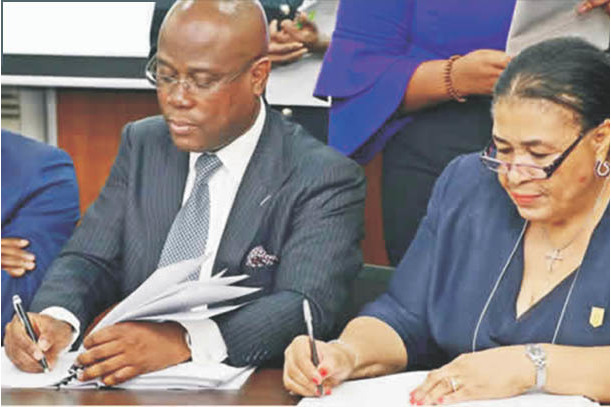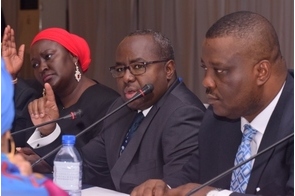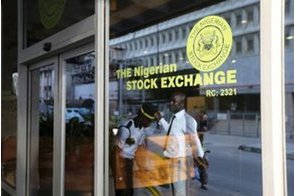Access Bank’s issuance of green bond affirms its sustainability leadership

Summary
Access Bank has issued a N15 billion green bond, considered to be the first-ever corporate green bond in Africa to be “Climate Bonds Certified.”
Since the United Nations Sustainable Development Goals (SDGs) came into effect in January 2016, there has been a growing need to scale up investment in climate action and sustainable development. But funding from governments and multilateral development assistance alone will fall short of the required SDG financing. Consequently, the private sector has stepped up to the plate. And with the advent of the SDGs has come renewed approach to investing that aims to incorporate environmental, social and governance (ESG) factors into investment decisions.
The UN has provided a set of principles, which underpin the global standard for responsible investing. Called the Principles for Responsible Investment (PRI), the principles are enabling sustainability factors to be embedded into finance. The global PRI market size – or financial assets that have been backed by PRI – is over $80 trillion.
With the mainstreaming of sustainability as signified by the huge amount of capital being committed to responsible investing, organisations are better able to manage risk, generate long-term financial returns, while also making positive social impact. As the sustainable finance market expands, more investors are demanding a variety of sustainability options. The markets are also responding with the emergence of new products. These new financial products are being created to fund projects that provide not only investable returns but also reduce carbon emissions and provide social benefits.
Apart from green bonds – also known as climate bonds – other innovative instruments include green loans, green commercial paper and other sustainability-linked instruments. 2018 witnessed a surge in issuance of sustainable debt products, according to a new study by BloombergNEF (BNEF), a research company and subsidiary of Bloomberg. The report showed the global sustainable debt market grew by 26 percent to $247 billion in 2018, with green bonds issuance amounting to $182.2 billion or 74 percent of the market last year. The climate bonds market aims to reach a milestone of $1 trillion by the end of 2020.
In Nigeria, Access Bank Plc, one of the largest banks in the country, joined FMDQ OTC Securities Exchange and the Securities Exchange Commission (SEC) of Nigeria to launch the Nigerian Green Bond Market Development Programme in June 2018. The three-year programme was designed to foster investment in green bonds as an alternative debt instrument to finance infrastructure and drive sustainable development by leveraging resources from domestic and international capital markets.
Following the launch of the programme last year, Access Bank has issued a N15 billion green bond, considered to be the first-ever corporate green bond in Africa to be “Climate Bonds Certified.” This certification is provided by the Climate Bonds Initiative (CBI) and is available for assets and projects that meet the requirements of the Climate Bonds Standard.
The certification is given to bonds whose related assets and projects contribute to achieving a low carbon economy. The CBI bonds labelling process entails rigorous scientific criteria that are consistent with the objectives of the Paris Agreement on climate change. In essence, the scheme is used by bond issuers, governments and investors to prioritise investments that genuinely contribute to addressing climate change.
The Access Bank's green bond, which was launched on March 18 during a signing ceremony that took place at the bank's head office in Lagos, is a five-year fixed rate senior unsecured bond. Priced at a coupon of 15.5 percent, the bond has been awarded an Aa- rating by Agusto & Co, a leading Pan-African credit rating agency, and its underlying framework was verified by PricewaterhouseCoopers (PwC). According to the bank, a wide range of asset managers and pension fund administrators participated in the bond issuance.
Access Bank’s Group Managing Director/CEO, Herbert Wigwe, who spoke during the signing ceremony of the green bond, said: “With our pace-setting experience in mainstreaming sustainability in our business operations, we are confident that this issue will further help in supporting environmentally-friendly investors to meet their investment objectives whilst simultaneously supporting the Bank’s customers towards realizing growth opportunities in a fast-developing low carbon economy.”
The bond issuance further solidifies Access Bank’s position as the leader in sustainable finance in Nigeria and Africa. Proceeds from the green bond will be used to finance projects that are in line with the Climate Bond Taxonomy, a guide that enables issuers to align their assets and projects with the requirements of the Climate Bonds Standard. The bond also signifies the bank's commitment to responsible investing.
Access Bank believes the bond presents a unique opportunity for financing Nigeria’s climate change objectives and address critical infrastructure gaps to drive economic growth. Nigeria is carrying its huge share of sustainable development burden, including poverty, hunger, public health and environmental challenges. Increasing desertification in some parts of northern Nigeria and the contraction of Lake Chad have caused significant devastation on farmlands and settlement areas. The country also continues to experience flash floods, which have displaced over half a million people.
As a signatory to the Paris Agreement, Nigeria has committed to reduce greenhouse gas (GHG) emissions by 20 percent unconditionally and 45 percent with international support by 2030. The 2015 Paris Agreement seeks the commitment of countries on the need to limit the global average temperature rise by 2 degrees Celsius (°C) or 3.6 degrees Fahrenheit (°F) above pre-industrial levels by the end of the century.
However, following new research conducted by the Intergovernmental Panel on Climate Change (IPCC), the UN has asserted the need for a stricter limit of 1.5°C or 2.7°F of global temperatures. According to the IPCC, temperatures increase by 1.5°C would be considered moderate. But an increase of 2°C would lead to the worst-case-scenarios of global warming.
To meet its obligation of reducing carbon emissions and mitigating the effects of climate change in the country, the Nigerian government listed a N10.69 billion sovereign green bond last July at the Nigerian Stock Exchange (NSE). The five-year bond was priced at a coupon rate of 13.48 percent. According to the Debt Management Office (DMO), the green bond created a benchmark for subsequent issuances of green bonds by state governments and corporates to finance environmental projects.
While the sovereign green bond issue further diversified the federal government’s funding sources amid dwindled oil revenue, Access Bank's corporate green bond has provided a way for corporate issuers to diversify their capital structures, as well as attract investors from both domestic and international markets.
Access Bank's ambitious green bond will also provide the impetus for other listed companies and corporate organisations in Nigeria to raise green capital. This will deepen the movement to reduce GHG emissions and save the world from the devastating impacts of climate change, while also promoting the corporate culture of responsible investing in the country.
Martins Hile is Executive Editor, Financial Nigeria
Related
-
Regulatory amendments to takeover: Process and impact of the new rules
These revisions have been provided to improve on the perceived lacunas within the existing laws.
-
NSE receives approval for sustainability reporting guidelines
The NSE said the approval of the guidelines is a fulfilment of its desire to champion sustainable capital market practices ...
-
NSE webinar highlights growth in sustainable investing
In his presentation, Scharfe, who is CEO of LuxSE, said there has been a shift from the green bond market towards social ...







